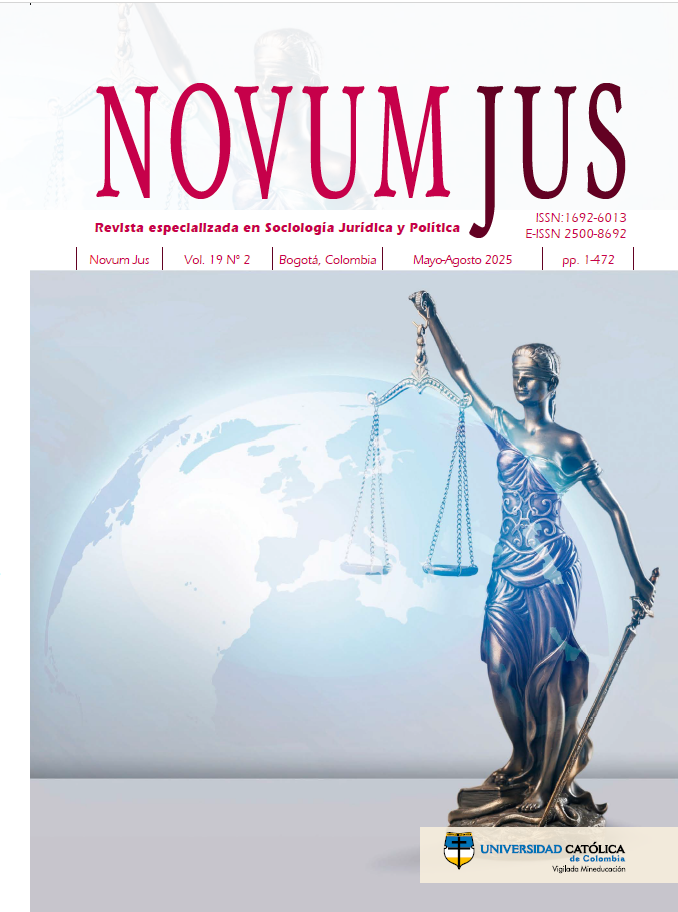
This work is licensed under a Creative Commons Attribution-NonCommercial 4.0 International License.
Authors who publish with this journal agree to the following terms:
- Authors retain copyright and grant the journal right of first publication with the work simultaneously licensed under a Creative Commons Attribution Non-Commercial License that allows others to share the work with an acknowledgement of the work's authorship and initial publication in this journal.
- Authors are able to enter into separate, additional contractual arrangements for the non-exclusive distribution of the journal's published version of the work (e.g., post it to an institutional repository or publish it in a book), with an acknowledgement of its initial publication in this journal.
- Authors are permitted and encouraged to post their work online (e.g., in institutional repositories or on their website) prior to and during the submission process, as it can lead to productive exchanges, as well as earlier and greater citation of published work (See The Effect of Open Access).
Abstract
Human rights have positioned themselves as a recurrent element in socio-legal studies, this is because their origin, and subsequent expansion, coincides with a historical period characterized by multiple conflicts, in which power structures were subjected to drastic changes. In its beginnings, human rights were conceived as a pillar of the new security architecture. However, their effectiveness is conditional on the strength of international institutions and their capacity for civilizational adaptation. This is where humanist international precepts are put to the test, mainly by political-civilizational criticisms of their suitability as instruments of global security, as well as their compatibility with the civilizational pluralism of the international community. The above allows us to contextualize the general purpose of this text, which is to analyze the discussion between two antagonistic ideological-law models (universalism and relativism) (with opposing perspectives on the foundation, content and scope of human rights) from the clash of civilizations. Consequently, the problem of this research lies in the historical development of the discussion between both visions, from the Universal Declaration to the international present. By congruence, as it is a basic and qualitative research, the methodology is historical-analytical, resorting to two methods during its development, descriptive and historical-analytical. The research techniques are of an indirect documentary type, consisting of the literary production (books and articles) of frontier authors. Concerning the findings, the most relevant is the identification of stages of the international humanitarian discourse, highlighting two: first, the drafting of the Declaration where it was intended to harmonize civilizational elements with human rights, after which we can conclude that these do not arise as a civilizational imposition; second, the rise of international liberalism as a humanitarian discourse, this is where the hegemonic universalism that criticizes relativism emerges.

References
Aguado, Gabriela & Fernando Vázquez. Derechos Humanos Hoy. Querétaro: Ediciones Navarra, 2022.
Agudelo Giraldo, Óscar A. & Astrid Rocío Galán. “Derecho injusto: fórmula de universalización y derechos humanos”. Novum Jus 9, núm. 2 (julio-diciembre 2015) 111-136. https:// novumjus.ucatolica.edu.co/article/view/922
Benhabib, Seyla. “Another Universalism: On the Unity and Diversity of Human Rights”. Proceedings and Addresses of the American Philosophical Association 81, núm. 2 (noviembre 2007): 7-32. https://www.jstor.org/stable/27653991
Boco, Rita & Gisela Bulanikian. “Derechos Humanos: universalismo vs relativismo cultural”. Alteridades 20, núm. 40 (julio-diciembre 2010): 9-22. https://www.scielo.org.mx/ pdf/alte/v20n40/v20n40a2.pdf
Bricmont, Jean. Humanitarian Imperialism Using Human Rights to Sell War. Traducido por Diana Johnstone. New York: Monthly Review Press, 2006.
Donelly, Jack. “Cultural Relativism and Universal Human Rights”. Human Rights Quarterly 6, núm. 4 (noviembre 1984): 400-419. http://fs2.american.edu/dfagel/www/Class%20 Readings/Donnelly/Cultual%20Relativism.pdf
Donelly, Jack. Derechos Humanos Internacionales. Ciudad de México: Trillas, 2015.
Fukuyama, Francis. “The end of History?”. The National Interest, núm. 16 (verano 1989): 3-18. https://www.jstor.org/stable/24027184
Galan, Astrid. “Los Derechos Humanos fundamentados mediante la legitimación y la moral jurídica”. Novum Jus 10, núm. 1 (enero-junio 2016): 31-48. https://novumjus. ucatolica.edu.co/article/view/1175/1162
Gvosdev, Nikolas K. “Russia: ‘European But Not Western?’”. Orbis 51, núm. 1 (invierno de 2007): 129-140. https://doi.org/10.1016/j.orbis.2006.10.008.
Hannum, Hurst. “The Status of the Universal Declaration of Human Rights in National and International Law”. Georgia Journal of International and Comparative Law 25, núm. 1 (1996): 289-392. https://digitalcommons.law.uga.edu/gjicl/vol25/iss1/13
Huntington, Samuel. ¿El choque de civilizaciones? Y otros ensayos sobre Occidente. Madrid: Alianza Editorial, 1993.
Huntington, Samuel. The Clash of Civilizations and the Remaking of the World Order. New York: Simon & Schuster, 1996.
Lambelet, Doriane. “The contradiction between soviet and american human rights doctrine: reconciliation through Perestroika and pragmatism”. Boston University International Law Journal 7, núm. 61 (1989): 61-63. https://scholarship.law.duke. edu/faculty_scholarship/850/
Llano Franco, Jairo Vladimir. “Pluralismo jurídico, diversidad cultural, identidades, globalización y multiculturalismo: perspectiva desde la ciencia jurídica”. Novum Jus 10, núm. 1 (enero-junio 2016) 49-92. https://novumjus.ucatolica.edu.co/article/view/1176
Matlock, Jack. “Can Civilizations Clash?”. American Philosophical Society 143, núm. 3 (septiembre 1999): 148-439. https://www.jstor.org/stable/3181955
Mattei, Ugo & Laura Nader. Saqueo cuando el Estado de Derecho es ilegal. Lima: Palestra, 2013.
Morsink, Johannes. The Universal Declaration of Human Rights. Origins, Drafting and Intent. Philadelphia: University of Pennsylvania Press, 1999
Muyskens, Kathryn. “Avoiding Cultural Imperialism in the Human Right to Health”. Asian Bioethics Review 14, núm. 1 (2022): 87-101. https://link.springer.com/content/ pdf/10.1007/s41649-021-00190-2.pdf?pdf=button
Patenaude, Bertrand. “Regional Perspectives on Human Rights: The USSR and Russia, Part One”. Stanford University, 2012. https://spice.fsi.stanford.edu/docs/regional_perspectives_on_human_rights_the_ussr_and_russia_part_one (acceso septiembre 24, 2024)
Sagüés, Néstor. La Constitución bajo tensión. Querétaro: Instituto de Estudios Constitucionales, 2016.
Stammer, Neil. “Human Rights and Social Movements: Theoretical Perspectives”. Revue interdisciplinaire d'études juridiques 75, núm. 2 (2015): 67-89. DOI10.3917/riej.075.0067
Tesón, Fernando. “International Human Rights and Cultural Relativism”. Virginia Journal of International Law 25, núm. 4 (1985): 869-898. https://ir.law.fsu.edu/cgi/viewcontent. cgi?article=1038&context=articles
Ulloa Plaza, Jorge & María Angélica Benavides Casals. “Moralidad, guerra y derecho internacional. Tres cuerdas para un mismo trompo: la humanidad”. Novum Jus, 17, núm. 1, (enero-abril 2023): 259–282. https://novumjus.ucatolica.edu.co/article/ view/4733/4606
Villamil Soto, Sandra Catalina. “Integración como fuente de conflictividad choque entre hegemonía y cooperación”. Novum Jus 10, núm 2 (julio-diciembre 2016): 77–87. https://novumjus.ucatolica.edu.co/article/view/1319




















